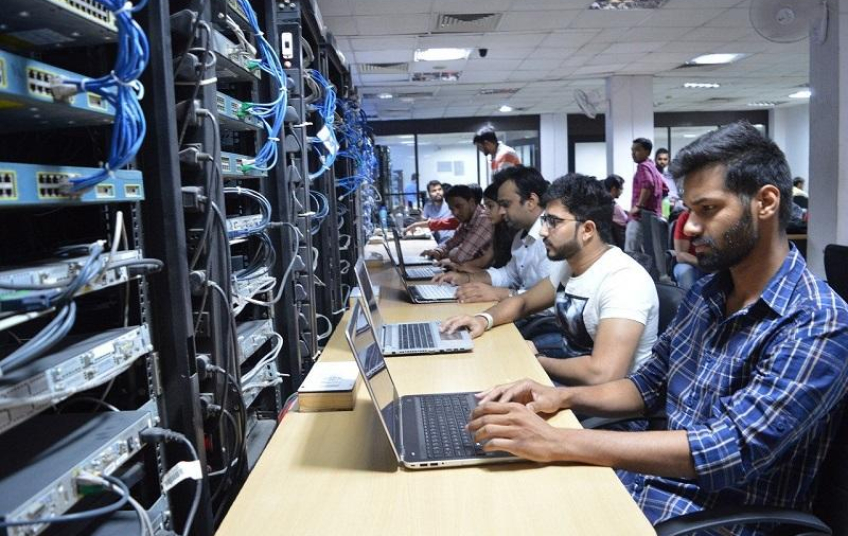Data centers are one of the fascinating areas of the technology world, especially the network, where working in them has its own charms. The dynamism of this industry has made specialists in this field always need to upgrade their knowledge and gradually progress in their work and experience job promotion. With the arrival of new and powerful technologies such as the Internet of Things (IoT) and artificial intelligence (AI), companies whose field of work is related to various industries are forced to invest in new digital infrastructures to maintain the market and overcome competitors. This issue has caused data centers to become one of the important pillars of the business world.
However, data centers are only able to provide the best services to companies and users if each of their aspects and underlying components are carefully examined by expert and skilled forces. For this reason, companies need to attract professionals with different skills and abilities. If you are interested in working in data centers, but do not know about job positions in this field, we suggest you read this article to the end to find good information about job titles in this field and then focus on learning the skills of each job title.
Communication networks are constantly improving, and if in the past, 400 gigabit networks were the focus of companies, today we are gradually seeing the entry of 800 gigabit networks into infrastructures, organizational networks, and data centers. This has made it difficult for data centers to keep pace with these changes. Specialists working in data centers have to examine different parts of data centers to meet the needs of supply chains, to respond to various customer requests, to implement strategies to optimize energy consumption in order to reduce costs, to ensure the proper functioning of data center components, etc. Due to the fact that it is not possible to evaluate the different parts of a data center by an IT expert alone, companies are forced to hire specialists who each have expertise in different areas.
The introduction of artificial intelligence and high-speed networks to data centers has created a huge technological revolution in this field and has made data centers an exciting and attractive place to work. Competitive salaries, high job satisfaction and a wide range of opportunities tempt every IT expert to pursue a career in this field. However, to enter this field of the network world, you have to choose your favorite trend first and then think about learning the skills related to the chosen trend.
Since the process of digitalization of companies has gained unprecedented momentum and almost the majority of user activities are done online, data centers are facing a heavy workload, while this industry is facing a severe crisis of specialist manpower. Now is the right time to enter the world of data center jobs, as various AI-based tools and solutions have been launched in the market to help professionals perform their assigned tasks, hence the working conditions in data centers are better than they have been in a few years. The past is better. In addition to competitive wages, high job satisfaction, and various career advancement paths, entering an industry that forms the basis of the latest technologies is a smart move that is likely to pay off brilliantly for professionals in the long run.
Lack of data center staff
Companies and small organizations have decided to transfer most of their business activities from internal infrastructure to data centers and use cloud infrastructure to carry out business activities in order to reduce costs. The increase in the workload of data centers on the one hand and the inability to attract competent employees on the other hand, has caused the data center industry to face a labor crisis. According to the Uptime Institute report, nearly 61% of data center managers are facing difficulties in hiring employees in 2020, compared to 55% in 2019. Another study conducted by the Uptime Institute indicates that nearly half of data center managers see labor shortages as their biggest challenge in the next seven years, indicating a good job market for professionals interested in working in the data center industry.
Skills needed to work in data centers
The data center industry requires different types of expertise and skills, so professionals who are new to the IT world or people who have experience working in this field will have no problem finding a job that suits their interests. The important principle is to have critical thinking, leadership ability and technical expertise to be able to perform assigned tasks properly. A survey conducted by Data Center Knowledge shows that the data center industry is in dire need of people familiar with the following areas:
IT management
Project management
Leadership
Network management
Security
Cloud computing
Applications management
Telecommunications
Data center certifications
One of the important factors that enable people to find a job that matches their skills and interests is IT certifications. Certifications indicate that people have the technical skills required to work in data centers. One of the most reliable and well-known documents in this field is the Data Center Certifi certificateed Associates is a Schneider Institute that provides technical expertise in the field of cabling and security. In addition, organizations expect IT experts to have network certifications such as CCNP, Cisco Certified Network Professional, and CCIE.
Have Cisco Certified Internetwork Expert. These certifications show that people have the technical knowledge to manage large-scale networks. If you are looking for management jobs in this field, we suggest that you think about getting high-level qualifications in the field of networking and especially data centers.
15 popular data center jobs in 2024
Now that we have an overview of data centers and their importance in the industry, it's time to introduce the top jobs in this field that pay well for professionals. Typically, most people start their career as a data center engineer with a bachelor's degree in computer science, information technology systems, electrical engineering, or a related field. In addition to educational qualifications, work experience in the field of networks and different teams and the ability to design and implement new information technology systems are important requirements that organizations pay special attention to. In addition to technical skills, IT experts must have the necessary skills in terms of analytical thinking, attention to details, time management and team work ability.
Data Center Administrator
Data center managers are responsible for maintaining business-critical systems, so they need to have in-depth knowledge of everything that happens in the data center.
To be more precise, this group of professionals should have knowledge and expertise in the field of infrastructure design, operations and life cycle management of physical and virtual data center assets.
Chief Architect
Chief architects, or more precisely, C-level executives, are responsible for centralizing IT functions; So that all the different parts of the data center work in an integrated way. This group of experts should design Ethernet networks and networks based on fiber channel in such a way that they have the ability to respond to the needs of users to access and store information. Because Fiber Channel networks and SANs have their own architecture and equipment, senior architects must have detailed technical knowledge of how to implement storage networks. For this reason, it is suggested that this group of professionals consider getting the Storage+ certificate, which provides them with the necessary technical knowledge in this field. Chief Architect is sometimes called Enterprise Architect.
Cloud Architect
A cloud architect is responsible for overseeing a company's cloud computing strategy. This person is responsible for developing strategic plans for the proper use of cloud computing services and ensuring that cloud infrastructure and virtual technologies work smoothly. Due to the fact that virtualization solutions are implemented on high-end servers and enclosures, cloud architects have the duty to carefully examine the usage of processing or storage resources and think about upgrading hardware components or adding new equipment if the workload increases. . In addition, cloud architects must define detailed virtual resource usage policies to ensure that virtual machines hosted on hypervisors use physical resources reasonably and correctly. It should be explained that cloud architects oversee the architecture and deployment of applications in cloud environments such as public cloud, private cloud, and hybrid cloud.
Data Engineer
The duties of engineers can vary from organization to organization, typically, these people are responsible for building data transmission bridges in order to collect information from different systems. Integrating, sorting, cleaning, formatting, and preparing data for use in business applications to gain insights from information helps organizations gain insight into how resources are being used. This insight helps them focus their investments on the areas that need to be addressed. In addition, the insights obtained from the data help organizations to predict the times when the resource utilization will be the highest and take the necessary measures for this purpose.
Data Wrangler
Data preparation is the process of removing errors and simplifying work with complex data sets so that they can be easily accessed and analyzed in a shorter period of time. Due to the ever-increasing growth of data and the resources used for data storage, it is necessary to store and organize a huge amount of data to accelerate data analysis. Data preparation professionals are responsible for cleaning and refining data so that data analysts and data scientists can use it. This job title has just entered the world of information technology and requires a high level of skills, but in this short period of time, it has faced unprecedented acceptance by companies. This group of specialists in data centers is responsible for organizing and preparing data collected from servers, storages and other network equipment in such a way that artificial intelligence specialists working in data centers can use them.
(DevOps)
DuOps engineers work with software developers, system operators (SysOps), and IT staff to oversee code releases and deployments. DevOps engineers must have enough experience in the field of hard and soft skills to be able to identify and overcome the traditional obstacles of software development and perform software tests properly. DevOps engineers in data centers oversee the process of building scripts and applications for monitoring the performance of equipment and networks so that administrators and network technicians can use them without problems.
Full Stack Developer
As we mentioned, in order to do some work, organizations have to develop applications that suit their needs. For this reason, they need a group of programmers to make this process possible. The full stack developer is appointed as the leader of the software teams to be able to propose practical solutions for the development of applications, use the latest techniques and technologies to the programmers, and define the roadmap for building applications based on the required methodologies. The term full stack refers to the technologies and skills required to complete a project. It is necessary to explain that some companies hire only one full-stack developer instead of hiring different programmers.
Network Engineer
One of the most lucrative and stable roles in the network world is the network engineer. Network engineers play a key role in business continuity because they are responsible for designing, implementing, maintaining, and optimizing network performance. In general, network engineers are responsible for managing the infrastructure of an organization's information technology systems. To be more precise, the network architect determines the construction plan of organizational networks and the network engineer implements it. So it is not surprising that network engineers have a special place in the world of network and data centers and all companies are looking for them.
Systems Administrator
A system administrator is a person who is responsible for maintaining computing environments that consist of multiple users and ensures that the systems run smoothly. In addition, it continuously monitors the performance of the backup systems so that if the main systems encounter problems, the backup systems automatically come online and take over the responsibility of the failed systems.
Virtualization Administrator
It is a specialist that has responsibilities including setting up and maintaining the virtual environment, in addition to the traditional tasks of managing operating systems. The virtualization administrator must have the ability to monitor and identify problems in virtual environments, so he must have sufficient knowledge about operating systems, network resources, virtual servers, virtual storage, virtual desktops, and applications installed on servers.
IT Director
A CIO is sometimes employed in place of a CIO. This person is responsible for receiving the reports received from the employees of different departments, proposing solutions to them to do things better, and providing a weekly report on the performance of the data center to the CEO.
Site Reliability Engineer
Is the expert who liaises with software developers to ensure that data center computing systems are scalable, stable and their performance is predictable. This job position requires a person who has knowledge and expertise in both software engineering and IT operational tasks.
Database Administrator
This person is responsible for directing or performing all activities related to maintaining the database environment. The database administrator ensures that the databases implemented in the data center work smoothly and that data is read and written to them smoothly. To be more precise, it keeps the performance of databases at the highest possible level by performing the necessary optimizations.
Chief Information Security Officer
Responsible for designing and implementing security solutions and programs to ensure that hackers cannot easily penetrate data center networks. The Chief Information Security Officer prepares security policies and checklists to protect the organization's communications, systems and assets against internal and external threats. Sometimes the CIO consults with the CIO to purchase the best software and hardware solutions for the data center and to define detailed disaster recovery plans.
IT Project Manager
This person is responsible for monitoring the process of planning, designing and implementing networks within the data center according to the policies and business goals of the organization. One of the important tasks of the information technology project manager is to determine the exact schedule, manage the budget, assign responsibilities to the right people, and closely monitor the process of doing the work.



























